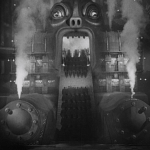 There’s a whole new climate of opinion that’s been sweeping over the educational scene in America these days. It’s all about accepting as perfectly normal the creation of a monstrous monolithic “learning” enterprise from preschool to post-college that consists of uniform standards, standardized testing, the collection of “data”, and the evaluation of teachers based on test scores (a practice incongruously called “value-added”).
There’s a whole new climate of opinion that’s been sweeping over the educational scene in America these days. It’s all about accepting as perfectly normal the creation of a monstrous monolithic “learning” enterprise from preschool to post-college that consists of uniform standards, standardized testing, the collection of “data”, and the evaluation of teachers based on test scores (a practice incongruously called “value-added”).
I find this development very troubling. Perhaps even more troubling is that so few educators are seriously questioning it. There’s a very corporate feel to this movement (and many of the terms used now in education such as “value-added” and “data” come directly from the corporate sphere). I hardly know where to start in critiquing this brave new world in education. Perhaps I can begin by quoting what one superintendent of schools declared was his optimal moment in learning: “I want to see all the kids on the same page at the same time.” There’s a uniformity to this movement that’s reminiscent of the dehumanizing machinery in Fritz Lang’s classic movie “Metropolis” (see photo).
Yes, I think that’s what’s at the core of this standardization of learning – it’s dehumanizing impact. We’re no longer concerned with educating whole human beings – instead we’re focused on collecting “data.” We’re no longer interested in the very different developmental worlds that preschoolers inhabit compared with elementary schoolers, middle-schoolers, or high-schoolers. Instead, preschoolers are now cramming for standardized tests that will determine which kindergartens they enter (see an article on this practice in the Chicago Tribune this week), and high school students are abusing stimulant drugs to keep them focused on their ever more “rigorous” Advanced Placement courses and exams. Everything these days in the classroom seems to be about “harder” “tougher” and “faster.”
Where are the voices that are saying “let’s slow things down, teach fewer things, chill out in the classroom, and take time to ponder the wonders of nature and culture.” The world is an incredible place. There are galaxies, and DNA, and Beethoven, and Moebius strips, and Impressionism, and Bali, and a million other things to be fascinated by. Why can’t classrooms become places where students are slowly and gently introduced to these things? Why can’t we allow children more time to play, more time to engage in “reverie” (those times of wandering off into mental space and considering life’s imponderables)?
Why can’t we spend time in the classroom inspiring teenagers to question the way things are, to challenge authority in the way that Robin Williams did in Dead Poet’s Society? Instead, everything these days is about getting ready for a four-year college, where there will be more pressure, more grades and test scores, more cramming, and less time to wonder about life and one’s possibilities. Will there never, then, be a time for students to learn about who they really are?
Thomas Armstrong is the author of If Einstein Ran the Schools: Revitalizing U.S. Education
This article was brought to you by Thomas Armstrong, Ph.D. and www.institute4learning.com.
Follow me on Twitter: @Dr_Armstrong



















